| |
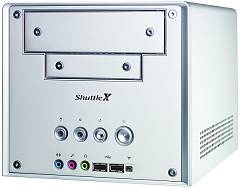 | - Mini aluminum barebone system
- Socket 478 supports 800/533/400FSB
and Hyper-Threading - New: SB61G2V3 supports Prescott
- Chipset: Intel 865G / ICH5
- Low noise with ICE-Heatpipe cooling
- Network connector: 100/10 MBit
- 1x PCI, 1x AGP (8X), 2x Dual Channel DDR400/333/266/200 memory,
8x USB 2.0, 2x Firewire - 6-channel audio with SPDIF in/out
- 2x Serial ATA connectors onboard
- New: SB61G2V3 with 250W Silent-X Power Supply
|      
      |  Frequently asked questions (FAQ) Frequently asked questions (FAQ)
Subchapters: Related Links | SB61G2/V3 Versions | Full System Configuration | No boot after overclocking? | Dual Channel | Full system configuration | No boot after overclocking? | Monitoring tools | Install onto C: drive | RAID installation | Hardware compatibility |  Related Links Related Links
Links concerning this chapter:  Versions SB61G2 and SB61G2V3 Versions SB61G2 and SB61G2V3
| Versions | SB61G2 | SB61G2V3 | Processor
Support | supports Northwood, the 'old' Willamette and
the 'new' Prescott are not supported | supports Northwood and Prescott,
the 'old' Willamette is not supported | | Box | 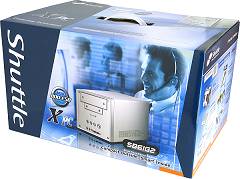 | 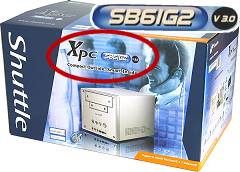
Version label on the top and side of the box. | | PSU | 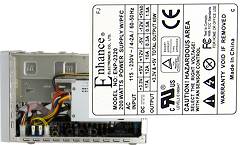
Standard mini power supply 200 Watt (e.g. Enhance) | 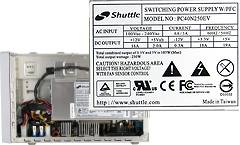
optimized Shuttle SilentX 250 Watt power supply | Mainboard
Version | 
Mainboard version up to v2.x (e.g. v 2.1) | 
Mainboard version 3.5 or higher | | Other | | Improved Heat Pipe efficiency
Improved cable management for better air flow |  Full System Configuration Full System Configuration
Is the SB61G2 capable of having most ports/slot occupied as a full system?
Base on Shuttle “Full Loading” test standard, the SB61G2 is tested with benchmark software for over 3 days with following installed: - Model: SB61G2BIOS: fb61s034
- CPU: P4 3.2GHz FSB 800MHz
- Memory: A-DATA DDR400 (PC 3200) 512MB * 2
- HDD: WD Raptor WD360 SATA 10,000rpm
- DVD-ROM: SONY DRU-510A DVD+RW
- USB device: Shuttle PC12 - USB2.0 card reader
- AGP card: ATi Radeon 9800 PRO (Build by ATi)
- PCI card: Hauppauge TV Tuner card
- Operating System: Windows XP Pro. + Service Pack 1
 Why my system can’t boot after overclocking CPU Clock? Why my system can’t boot after overclocking CPU Clock?
When overclocking the CPU FSB Clock, the memory frequency will also overclock at the same time. When overclocking make sure that you set the memory frequency to lower level, such that increases in FSB keep the memory frequency in a stable range. First deselect [Auto] for the “Memory Frequency For” as shown below. Try to set memory frequency to a lower level (ex. DDR 266 / 333). 
 How can I check my DDR is performed with Dual channel mode or not? How can I check my DDR is performed with Dual channel mode or not?
1. Please press “Tab” key immediately when your screen show up the Intel logo. 
2. Please check the message from your monitor. 
Note: Please refer to the user’s manual page 40, you have to use the same size and type DIMMs on Channels 0 and 1.
 What is an example full system RefleXion XPC? What is an example full system RefleXion XPC?
An example RefleXion XPC full system is listed below. This full system has been tested according to Shuttle’s “Full Loading” test standard. With the following components installed, the RefleXion XPC continuously runs benchmarking software for over three days. - Model: RefleXion XPC
- BIOS: fb61rs06
- CPU: P4 3.4GHz FSB 800MHz
- Memory: Kingston DDR400 (PC 3200) 1GB * 2
- HDD: WD Raptor WD360 SATA 10,000rpm
- DVD-ROM: Shuttle 16X DVD_ROM (Built in)
- USB device: Shuttle 6-in-1 Card Reader (Built in)
- Shuttle Wireless LAN Module (Built in)
- AGP card: ATi Radeon 9800 XT (Build by ATi)
- PCI card: WinFast TV2000 TV Tuner card
- Operating System: Windows XP Pro. + Service Pack 1
 Why won’t my system boot after overclocking CPU Clock? Why won’t my system boot after overclocking CPU Clock?
When overclocking the CPU FSB Clock, the memory frequency will also overclock at the same time. When overclocking make sure that you set the memory frequency to lower level, such that increases in FSB keep the memory frequency in a stable range. First deselect [Auto] for the “Memory Frequency For” as shown below. Try to set memory frequency to a lower level (ex. DDR 266 / 333). 
 What temperature monitoring utilities are available? What temperature monitoring utilities are available?
The following links contain freeware/shareware for CPU/System/HDD temperature monitoring utilities :  Why won’t my operating system install onto the C: Drive? Why won’t my operating system install onto the C: Drive?
This could be due to the internal card reader using the “C” drive title (and D, E F). Since the card reader is pre-installed, it has automatically been allocated the first 4 letters (starting from C). Try one of the follow solutions to install your operating system onto the C drive and avoid such issues: - 1. Remove the card reader cable before install operating system.
- 2. Disable onboard USB controller before install operation system.

| Navigation |
 |
|
























